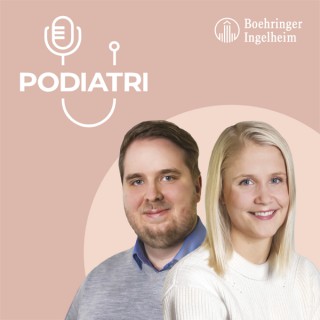Podcasts about teppo j
- 7PODCASTS
- 9EPISODES
- 36mAVG DURATION
- ?INFREQUENT EPISODES
- Dec 16, 2025LATEST
POPULARITY
Latest podcast episodes about teppo j
In this episode, we hear how Generative AI is making it into the consultation room - but not through NHS endorsed routes - surveys suggest that ⅔ of doctors are using AI, for backoffice tasks - but also increasingly for information and diagnosis. David Navarro, a research fellow in generative AI at the Australian Institute of Health Innovation, Charlotte Blease, associate professor at the Participatory eHealth and Health Data Research Group at Uppsala University, and Marcus Lewis, GP in London, reflect on what we know about the real way in gen AI is being used - and what “triadic care” (doctor, patient and AI) will mean for the future of the therapeutic relationship. We also hear from Teppo Järvinen, professor of orthopaedic surgery at Helsinki University, about surgical subacromial decompression - a 10 year follow up of a double blinded placebo controlled trial, confirms that surgery is no more effective than standard care. Yet surgical interventions continue - we hear why. Finally, we go to a Cholera clinic in Nigeria, where Médecins Sans Frontières are running cholera treatment centres, which you can help by donating to our Christmas appeal. Links Generative AI and the clinical encounter The BMJ appeal 2025-26: Inside MSF's response to cholera in Nigeria: a day in the life of an emergency doctor Arthroscopic subacromial decompression versus placebo surgery for subacromial pain syndrome
Should I have an arthroscopy for my knee osteoarthritis? Insights from experts
On this week's special episode, we will hear from experts in arthroscopy and surgery including content from:Chris Vertullo and Teppo Järvinen - Should I have an arthroscopy for my knee arthritis? (Season 1, Episode 9)Howard Luks - Do you really need surgery for your knee osteoarthritis? (Season 2, Episode 20)Teppo Järvinen - Arthroscopy, past time to stop the harm (Season 4, Episode 4) CONNECT WITH USTwitter: @ProfDavidHunter @jointactionorgEmail: hello@jointaction.infoWebsite: www.jointaction.info/podcastIf you enjoyed this episode, don't forget to subscribe to learn more about osteoarthritis from the world's leading experts! And please let us know what you thought by leaving us a review! Hosted on Acast. See acast.com/privacy for more information.
Arthroscopy, past time to stop the harm with Prof Teppo Järvinen
Over the years, there has been good evidence that certain treatments are of little or no value, provide harm and have substantial costs associated with them. Arthroscopic partial meniscectomy (APM) is not a recommended treatment for osteoarthritis. Despite this, millions of these procedures are still being performed each year. On this week's episode of Joint Action we are joined by Professor Teppo Järvinen to discuss the evidence behind APM and evidence-based medicine.Professor Teppo Järvinen, an orthopaedic surgeon at the department of orthopaedics and trauma at Helsinki University and Helsinki University Central Hospital. Teppo led the Fidelity trial and has a strong interest in the “too much medicine” movement.CONNECT WITH USTwitter: @ProfDavidHunter @jointactionorgEmail: hello@jointaction.infoWebsite: www.jointaction.info/podcast Hosted on Acast. See acast.com/privacy for more information.
Tämä jakso voi loukata herkimpiä kuuntelijoita. Voi nimittäin olla, että tekemäsi työ on ollut turhaa, ainakin joidenkin tutkimusten mukaan. Vahvasta ilmaisustaan tunnettu Tampereen yliopiston professori, ortopedi ja luuseppä Teppo Järvinen pohtii, onko mikään hoito vaikuttavaa ja toteaa, että nykyään on aina paremmin kuin ennen.
I avsnitt 13 svarar och diskuterar Daniel och Kenneth på vanliga patientfrågor: Är knaster/knak från leder farligt? Är det skillnad på träning och rehab? Vad är orsaken till akut ryggvärk? Kan konditionsträning vara lika effektiv som styrketräning vid smärttillstånd? Vad är skillnaden mellan kiropraktor och naprapat? Finns det någon metod som bättre kan kvantifiera senans struktur än vanligt konventionellt ultraljud? Kan man fortsätta träna trots smärta? Vad är det nästa "stora" inom senforskning? Fungerar hållningskorrigerande tröjor? På slutet diskuteras en nypublicerad review [PDF] som undersökt och sammanställt den senaste forskning på effekterna av subacromial dekompression, placebooperation och konservativ behandling. Daniel råder slutligen alla lyssnare som funderar på att operera sin axel med subacromial dekompression att lyssna på en intervju med ortopeden och professorn Teppo Järvinen. Följ Tyngre Rehab och värdarna på Instagram: @Tyngrerehab, Daniel Andréasson, Kenneth Färnqvist, Adrian Valkeaoja och Erwin Lindén.
Management of shoulder pain has been estimated to account for 4.5 million visits to the doctor and $3bn (£2.3bn; €2.6bn) each year in the US alone. 44-70% of patients with shoulder pain are diagnosed with shoulder impingement syndrome. Although various non-operative treatment modalities are recommended as initial treatment for patients with shoulder impingement, subacromial decompression has become one of the most frequently performed orthopaedic procedures in the world...BUT DOES IT ACTUALLY HELP? On this week’s episode, Prof. Teppo Järvinen (@shamteppo) joins BJSM’s Daniel Friedman (@ddfriedman) to discuss the results from his latest clinical trial – the FIMPACT trial - that was recently published in the BMJ. Teppo is a Professor of Orthopaedics and Traumatology at the University of Helsinki and Helsinki University Hospital, and is head of the Finnish Centre for Evidence-Based Orthopaedics. He recently organised the 2018 Too Much Medicine symposium that took place in Helsinki, Finland. http://too-much-medicine.com/ In this 15 minute conversation, Prof. Järvinen addresses: ∙ shoulder impingement and subacromial decompression ∙ a brief overview of the FIMPACT trial ∙ the results of the trial and how to integrate the findings into clinical practice ∙ what does too much medicine mean for orthopaedic surgery ∙ the future of sham surgery Further reading: Paavola Mika, Malmivaara Antti, Taimela Simo, Kanto Kari, Inkinen Jari, Kalske Juha et al. Subacromial decompression versus diagnostic arthroscopy for shoulder impingement: randomised, placebo surgery controlled clinical trial BMJ 2018; 362 :k2860 https://www.bmj.com/content/362/bmj.k2860 FIDELITY infographic: https://www.bmj.com/content/bmj/362/bmj.k2860/F1.large.jpg Beard, David J., et al. "Arthroscopic subacromial decompression for subacromial shoulder pain (CSAW): a multicentre, pragmatic, parallel group, placebo-controlled, three-group, randomised surgical trial." The Lancet 391.10118 (2018): 329-338. https://www.thelancet.com/journals/lancet/article/PIIS0140-6736(17)32457-1/fulltext Sihvonen R, Paavola M, Malmivaara A, et al. Arthroscopic partial meniscectomy versus sham surgery for a degenerative meniscal tear. N Engl J Med 2013;369:2515–24. https://www.nejm.org/doi/10.1056/NEJMoa1305189?url_ver=Z39.88-2003&rfr_id=ori:rid:crossref.org&rfr_dat=cr_pub%3dwww.ncbi.nlm.nih.gov FIDELITY study video: https://www.youtube.com/watch?v=RaDWkJHmEB0 Savulescu, Julian, Karolina Wartolowska, and Andy Carr. "Randomised placebo-controlled trials of surgery: ethical analysis and guidelines." Journal of medical ethics (2016): medethics-2015.https://jme.bmj.com/content/42/12/776
Sham surgery for meniscal knee pain – Boom! Boom! Boom! Prof Teppo Järvinen rocks the boat
Ahead of the Finnish Sports Physiotherapy Congress (June 9 and 10, 2017), BJSM editor in chief Karim Khan, chats with the senior author of a study that proved that partial removal of a degenerative torn meniscus does not alleviate mechanical symptoms when compared with sham surgery. That was Teppo Järvinen (http://bit.ly/2rlfW5I), professor of orthopaedics and traumatology at the University of Helsinki and a speaker at the Finnish Congress in June. Before that study (link below), orthopaedists were confident of the benefits of arthroscopic surgery on patients suffering from mechanical symptoms. However, “scientific proof of the benefits had been based entirely on uncontrolled follow-up studies,” said Dr Raine Sihvonen, specialist in orthopaedics at the Hatanpää Hospital in Tampere and first author of the study. Here is the link to the study in the New England Journal of Medicine: http://www.nejm.org/doi/full/10.1056/NEJMoa1305189#t=article In the podcast we cover: - A bird’s eye view of Bruce Moseley’s seminal sham surgery study – arthroscopy was no more helpful for knee arthroscopy in older people than sham surgery http://www.nejm.org/doi/full/10.1056/NEJMoa013259#t=article - The fact that MRI is not a good predictor of who will benefit from knee arthroscopy. Here’s Dr Martin Englund’s NEJM paper. http://www.nejm.org/doi/full/10.1056/NEJMoa0800777#t=article - Ewa Roos’ and Nina Kise’s study showing that exercise provides as good results as arthroscopic meniscectomy. Remember – the patients who fail rehab also fail surgery. Look for other solutions – not arthroscopy – to cure that patient. http://www.bmj.com/content/354/bmj.i3740 Links: Here’s a YouTube video summarizing the FIDELITY study in 4 minutes. https://www.youtube.com/watch?v=RaDWkJHmEB0 Here the link to the Finnish Sports Physiotherapy Congress – June 9 & 10, 2017. http://fspa-congress.com/
Tiedeykkönen: Millä tolalla on lääketutkimus - ainakin masennuslääkkeitä arvostellaan
Helsingin yliopiston professori Teppo Järvisen mukaan lääketiede on nuori tieteenala, josta puuttuu avoin keskustelu ja lähdekritiikki. Vakiintuneet käytännöt hyväksytään usein kritiikittä. Tanskalainen lääketieteen tutkija Peter Gøtzsche arvostelee erityisesti lääketutkimusta, joka tällaisenaan tuottaa pahimmillaan huonoja lääkkeitä. Erityisesti hän arvostelee masennuslääkkeitä. Psykiatrian professori Erkki Isometsä vastaa Peter Gøtzschen kritiikkiin. Toimittaja Nina Malmberg
Dr. Teppo Järvinen appears on the international "Too Much Medicine" stage with his concerns about the way osteoporosis - bone thinning - is diagnosed and treated. Järvinen is an orthopedic surgeon and sports medicine specialist in Helsinki, Finland. I interviewed him at the Preventing Overdiagnosis 2015 conference at the National Institutes of Health.










